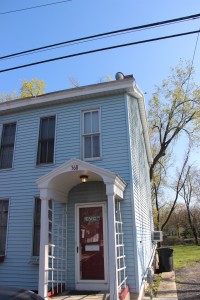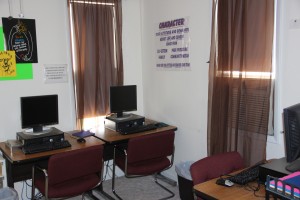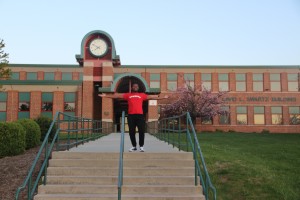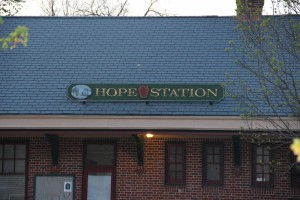Introduction:
There is a crisis that exists in the Carlisle Area School District. While data will show that the graduation rate for the Carlisle Area High School is higher than the national average, this is not the truth for all the demographics represented. The dropout rate for young men of color at Carlisle Area High School is not only high but is increasing as each year passes by. To combat this pattern, students at Dickinson College have partnered with Carlisle Victory Circle (C.V.C) to aid the young men of Carlisle. C.V.C’s mission seeks to challenge young minds through youth development workshops, community service opportunities, and after school programs. The goal of these services seeks to assist the community’s youth with their personal and academic success. Carlisle Victory Circle once offered a youth male mentorship program that existed for one year as a means to assist and encourage young males within the Carlisle Comm unity. Although it had tremendous success, the program was discontinued due to a variety of circumstances. However, with the help of Ms. Sonya Browne, Quadrese Glass, Teryon Lowery, and Karl Lyn, the youth male mentorship program has been resurrected. Carlisle’s “Men Overcoming Obstacles” operates as a branch of Carlisle Victory Circle, and aims to provide male youth with leadership workshops, after school tutoring, and a space for self-reflection. With the assistance of C.V.C and Dickinson College, Men Overcoming Obstacles will help these young men gain access to facilities and education of which some youth are deprived. Carlisle Community members lack access to resources, support, and knowledge that are allocated to other communities. As Carlisle Victory Circle has already implemented a program for young women, GirlPower!, Men Overcoming Obstacles will help apportion resources, such as a two story house and educational amenities to male youth as an initiative for social justice. This program will achieve this mission through a series of measures such as leadership workshops, community service opportunities, guest speakers, college visits, and homework tutoring sessions.
unity. Although it had tremendous success, the program was discontinued due to a variety of circumstances. However, with the help of Ms. Sonya Browne, Quadrese Glass, Teryon Lowery, and Karl Lyn, the youth male mentorship program has been resurrected. Carlisle’s “Men Overcoming Obstacles” operates as a branch of Carlisle Victory Circle, and aims to provide male youth with leadership workshops, after school tutoring, and a space for self-reflection. With the assistance of C.V.C and Dickinson College, Men Overcoming Obstacles will help these young men gain access to facilities and education of which some youth are deprived. Carlisle Community members lack access to resources, support, and knowledge that are allocated to other communities. As Carlisle Victory Circle has already implemented a program for young women, GirlPower!, Men Overcoming Obstacles will help apportion resources, such as a two story house and educational amenities to male youth as an initiative for social justice. This program will achieve this mission through a series of measures such as leadership workshops, community service opportunities, guest speakers, college visits, and homework tutoring sessions.

The Clubhouse at 368 W. North St.
By working with Carlisle Victory Circle to create this male youth mentorship program, I have understood the myriad of injustices that prevail within marginalized communities such as lack of resources and educational deprivation. However, I also understand the ways in which justice can be restored within these communities. Before I began the process of establishing Men Overcoming Obstacles, I decided to research the necessity and significance of executing such an idea. My research consisted of analyzing statistical data on male youth outcomes, reviewing successful and unsuccessful accounts of similar mentorship programs, and community outreach within the Carlisle community I wish to serve. These modes of research served as a basis for developing Men Overcoming Obstacles. The statistical data that I gathered from the Pennsylvania Census Bureau and Carlisle Area School District corroborated the national trend that minority youth are prime victims of social and educational underachievement. In addition to this information, when I conversed with Carlisle community members around 149 W. Penn street about a potential youth mentorship program, I became aware of a few sentiments that pervade the community’s minority male youth such as low self-esteem, difficulties with identity construction, and alienation. These realities that my research illuminated are not reflections on the individual community members, but rather a reflection on the impact of structural inequality and social injustice. In his article, Understanding Cultural Diversity and Learning, Professor John Ogbu delineates the ways in which individuals are subjected to injustices according to their individual identities. He states, “Structural forces such as gender, class, and ethnicity circumscribe one’s opportunities” (Ogubu 2). Ogubu’s assertion that components of one’s identity can limit one’s access to opportunities is indicative of Carlisle community members’ experiences. The young males that I spoke with in Carlisle were predominately Black and Latino males. I found that these youth lacked opportunities and developmental resources such as educational support, counseling, career guidance, and spaces for social engagement. My overall research revealed that a male youth mentorship program established in Carlisle is pivotal, and will be able to serve as a social justice intervention plan.
few sentiments that pervade the community’s minority male youth such as low self-esteem, difficulties with identity construction, and alienation. These realities that my research illuminated are not reflections on the individual community members, but rather a reflection on the impact of structural inequality and social injustice. In his article, Understanding Cultural Diversity and Learning, Professor John Ogbu delineates the ways in which individuals are subjected to injustices according to their individual identities. He states, “Structural forces such as gender, class, and ethnicity circumscribe one’s opportunities” (Ogubu 2). Ogubu’s assertion that components of one’s identity can limit one’s access to opportunities is indicative of Carlisle community members’ experiences. The young males that I spoke with in Carlisle were predominately Black and Latino males. I found that these youth lacked opportunities and developmental resources such as educational support, counseling, career guidance, and spaces for social engagement. My overall research revealed that a male youth mentorship program established in Carlisle is pivotal, and will be able to serve as a social justice intervention plan.
After recognizing that a youth male mentorship program could yield justice to Carlisle community members who lack opportunities and resources, I began periodically meeting with two of my colleagues who are also attached to this idea to coordinate, plan, and structure the program. As my colleagues and I collaborated on this project, it became clearer that a youth mentorship program was a means of reconstructing different forms of justice. The first form of justice that I sought to achieve was communal justice. In his book, Racism, African Americans, and Social Justice, Rudolph Alexander delineates communal justice as “consisting of individuals, groups, and organizations within society pursuing and promoting the common good” (Alexander 4). With Alexander’s delineation in mind, a question with which I grappled was who decides this “common good” and will it truly be for the benefit or interest of an entire community. Instead of my group and I imposing what we believe to be a benefit to the community, I decided to speak with community members about what they would like to see in their community and in a youth mentorship program. This outreach was a way for community members to construct their own ideas of communal justice according to their individual subjectivities. My colleagues and I took these sentiments and subsequently integrated them in our ideas and plans for the program.

Computer Lab
In addition to communal justice, another form of justice that I considered was distributive justice. Alexander explicates distributive justice as “involving the responsibility through the government to allocate resources and burdens fairly” (Alexander 4). Due to the lack of resources from the government, I collaborated with my group members to think of ways in which we can help restore the distribution of resources. One of the resources that Men Overcoming Obstacles provides is a two-story house that serves as a space for social engagement, homework sessions, and community development. Within the house, we also provide resources such as computers, Microsoft office software, an array of books, and a kitchen for healthy cooking. In addition to distributing resources to the community, I also noticed there was an unequal distribution of knowledge amongst Carlisle’s youth residents. While, older people were aware of particular information and amenities that served for their individual advancement, the community’s youth were oblivious to those services. Knowledge about physical, mental, social, and sexual healthiness are a few subjects that parents within the community expressed that youth should be educated on. So in addition to the distribution of material resources, I also thought about ways in which I could distribute information and knowledge. I utilized Dickinson College’s campus resources such as the career center and wellness center by collecting their free brochures and placing them within the M.O.B house. These brochures will supply the youth with information that they do not typically have access to such as career guidance and health advice.
What you see and what you hear depends a great deal on where you are standing ~ C.S. Lewis
Alexander defines social justice as; the duty of privileged individuals to advocate for the well-being of those susceptible to injustice (2005). Being a college student at a Liberal Arts college, I have a sense of privilege. I have access to resources that others do not; therefore, I have a social responsibility to assist those experiencing injustice. Aside from what I could potentially dispense to the community, members of the community have knowledge that is relevant to my own learning process. By participating in service learning projects, one is exposed to an array of practical skills that college students often lack (Eifler, Kerssen-Griep and Thacker). Usually these skills are learned by the “organic intellectuals” of the community. They are individuals sometimes without a formal college education, yet are well versed in the “interest of their particular class” (Chrisman, 2013). Men Overcoming Obstacles aims to use the resources that are made available to Dickinson students, and gain insight from the Carlisle community on the interest and needs of its residents.

Quadrese’ at the Carlisle High School
We have been in conversation with Dickinson’s office of Student Life and Admissions, to discuss the process of inaugurating local students to the college experience. Even though these offices reported to us that they are unable to provide funding for the programming of Men Overcoming Obstacles, we were assured that we are free to use on campus spaces for Men Overcoming Obstacles’ activities. We are also in conversation with the Career Center, discussing the possibility of a representative speaking with the participants of Men Overcoming Obstacles. This talk we hope will expose the young men to a range of career opportunities that are available to them, and outline the current steps they can take in order to attain them. Furthermore, there are numerous Dickinson students who have expressed interest in participating in this program. After we receive further approval from C.V.C, establish a base participation group, and design volunteer applications, we will extend an invitation to those who are interested. Our method of consulting the resources that are readily available on Dickinson, which in turn we will use to support our community service initiatives, correlates to the assertion that this approach “[p]rovide[s] [a] multi-disciplinary assistance to communities…. that improve their…. environments” (Shelton, 2016). Because residents are equipped with resources that concentrates on specified areas in the community, they can use them in order to better the entire community.

Hope Station
Our first means of collaborating with the community was with Carlisle High School. We reached out to this school because of Carlisle Victory Circle’s previous relationship with them. We are currently waiting for the principal to give us clearance to recruit students. Until then, we are beginning to reach out to a local community organization, Hope Station, which has a strong connection with the youth in the community. Community organizations, like Hope Station, allows for organic intellectuals to interact with college volunteers. This interaction not only deepens one’s knowledge of the community, but volunteers also learn valuable skills (Eifler, et al 2008). In collaboration with Hope Station we aim to enhance their students’ availability to computers and our lack of students occupying the Clubhouse. Presently, Teryon, Karl, and I are in the process of creating a flyer. Our flyer will outline the programs that M.O.B offers and at upcoming community events, we plan to distribute them to community members in an effort to gain interest.
As a result of my experience in working with the community, I have come to understand social justice as an initiative t hat is multi-faceted. It requires multiple partners, from diverse backgrounds, who all share a similar vision for the community. Also, working for social justice is a process that is not easily achieved. While working to construct the components of Men Overcoming Obstacles, we were faced with many obstacles that seemed unsurmountable. We concluded that there was a need for the collaboration with organizations in the community in order to gather youth participants. With Men Overcoming Obstacles, we are combating the insufficient support that exists for the young men of color in the Carlisle community. We are providing a venue for these young men to express their grievances amidst a world that often mitigates their experiences.
hat is multi-faceted. It requires multiple partners, from diverse backgrounds, who all share a similar vision for the community. Also, working for social justice is a process that is not easily achieved. While working to construct the components of Men Overcoming Obstacles, we were faced with many obstacles that seemed unsurmountable. We concluded that there was a need for the collaboration with organizations in the community in order to gather youth participants. With Men Overcoming Obstacles, we are combating the insufficient support that exists for the young men of color in the Carlisle community. We are providing a venue for these young men to express their grievances amidst a world that often mitigates their experiences.
If we don’t stand up for our children, then we don’t stand for much
~ Marian Edelman
David Miller States in his work, Principles of Social Justice, “social justice is regarded as an aspect of distributive justice”, which is “the fair distribution of benefits among members of various associations” (Miller 2). As we have already stated, hidden behind a mist of positive graduation rate statistics, there dwells an issue in the Carlisle Area School District. Young men of color are not finishing high school. While multiple factors attribute to this, it is evident that these young men are lacking encouragement to finish school. Men Overcoming Obstacles was created to combat the lack of focus on young men of color in Carlisle, PA. Women of color have similar issues yet they have specific organizations and programs that focus solely on encouraging them. In the same way that these programs, Carlisle Victory Circle’s GirlPower! and the Carlisle Girl Scouts, exercise positive academic, social, and leadership qualities in young women, we aim to do the same with young men. Our goal is to provide young men with academic support and encourage them to finish high school while also teaching them how to be better members of their community through tutoring, leadership workshops, community service, community engagement, and sustainability.
While each member of this group worked together on every aspect of this project, I focused primarily on the structuring of our program. To create a program that was not only unique but effective, I looked closely at similar programs and their positives and negatives. Through this method I realized that for this program to be an effective mentorship program, where the mentors and students would build healthy relationships, consistency is key. To ensure this a separate schedule and application was made for mentors that would be background checked as well as trained. Once the mentors are selected, they will have set days that they will be at the program. This will allow the students to become familiar with, and hopefully trust, the mentors. Another thing I realized is that many academic programs forget to incorporate community service and engagement into their programs. This program was created in the hopes of benefitting the community of Carlisle and thus we have decided to make community service, outreach, and sustainability apart of our core values.
The programs we hope to incorporate are as follows. We wish to set up a peer tutoring program. This would require that the older students come 30 minutes earlier to the program so that they would finish before the younger students and thus would be able to help them with their work. This would be the first step in teaching the students about leadership, community service, and mentorship. We believe that it’s important that these mentees will one day take what they learn from this program, the skills that we are trying to foster, and use it, so that if their is a lack of interest from Dickinson students, they can keep the program operating themselves. Secondly, we wish to have leadership workshops led by trained mentors. We will critique what it means to be a leader, as well as have exercises that foster and engage leadership skills and qualities. We will also have community service obligations which will include, working at Hope Station, neighborhood cleanup, working at the Soup Kitchen, tutoring, and fundraising for other organizations. This will teach the students the importance of investing in one’s own community and will also be a way of allowing them to be on the giving and not receiving side of community service. This is important as it will show them that not only do they have a stake in their community but they are contributing to its progress. Finally, we wi sh to use the space outside our clubhouse to create a garden. As of know we do not know what we will grow but ideas range from a community garden to a food garden where we would sell our produce to the farmers’ market to help fund our program.
sh to use the space outside our clubhouse to create a garden. As of know we do not know what we will grow but ideas range from a community garden to a food garden where we would sell our produce to the farmers’ market to help fund our program.
The outcomes of the program have been as following. We have a space for the program, we have community support, we have a mission statement, and we have applications for mentors. The issue that we have right now is that we do not have the students yet. To combat this we have shifted our recruiting ideology and have decided to go straight to the community to recruit students. In doing this we hope to show the community our dedication in helping these students. Through this project my ideology of social justice has altered. I used to be under the impression that social justice was about people helping others because they have more than them and are in a position to help. Now I understand it to be people helping people because they lack the basic resources and support that has been provided to other members of the community. Social justice is not a hobby; it is a necessity.
Without education, you are not going anywhere in this world
~ Malcolm X
Conclusion:
As a means to ensure that M.O.B is not a temporary program, there are several methods that we will employ to guarantee lasting success. Firstly, it is essential that a partnership with Dickinson College be maintained. Dickinson has the means to provide resources to the men of M.O.B that will complement its overall mission of youth development. From Dickinson, we will seek the assistance of their Career Center, Wellness Center, P.E.A.C, and the Dickinson Farm. M.O.B members too will have the opportunity to participate in on-campus activities, lectures, fairs, sporting events, and classes. In addition to maintaining a relationship with Dickinson, the advancement of mentees into mentors will be utilized to preserve the effectiveness of M.O.B. Also, the mentors will serve as a source of motivation for the matriculating group of young men. Additionally, communal interest is important for M.O.B’s sustainability. We will invite community members to a series of open houses and social gatherings held at the Clubhouse in order to continuously generate interest. Finally, representation of M.O.B and its constituents should be visible on the board of C.V.C. Representatives must have the vested interest of M.O.B in mind when they are deliberating on issues that could potentially modify the dynamics of the program. One area of representation will be fundraising. The representatives will fundraise for the programming of M.O.B as to mitigate any future instance of financial issues that may arise. These initiatives will serve to sustain the efficacy and integrity of M.O.B. Lastly, the use of C.V.C, as an ally will aid in the formation of communal connections. C.V.C is revered within the Carlisle community, so through collaboration with C.V.C, MOB will have a brand that the Carlisle Community is familiar with and trusts.
Bibliography:
Alexander Jr, Rudolph. Racism, African Americans, and Social Justice . Lanham : Rowman & Littlefield Publishers, Inc. , 2005.
Chrisman, Robert. “Black Studies, the Talented Tenth, and the Organic Intellectual .” Black Scholar (2013): 64-70.
Eifler, Karen E., Jeff Kerssen-Griep and Peter Thacker. “Enacting Social Justice to Teach Social Justice: The Pedagogy of Bridge Builders.” Catholic Education: A Journal of Inquiry and Practice (2008): 55-70.
Sanon, Marie-Anne, Robin A. Evans-Agnew and Doris M. Boutain. “An exploration of social justice intent in phtovoice research studeis from 2008 to 2013.” Nursing Inquiry (2014): 212-226.
Shelton, Aimee J. “Implementing Community Engagment Projects in Classrooms.” Journal of Higher Education Theory & Practice (2016): 61-67.
Leave a Reply